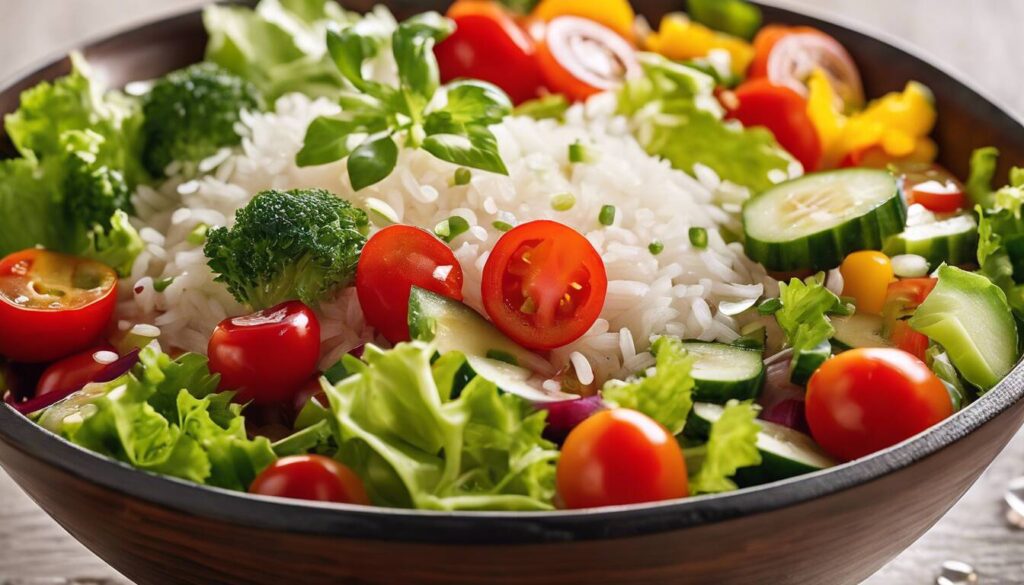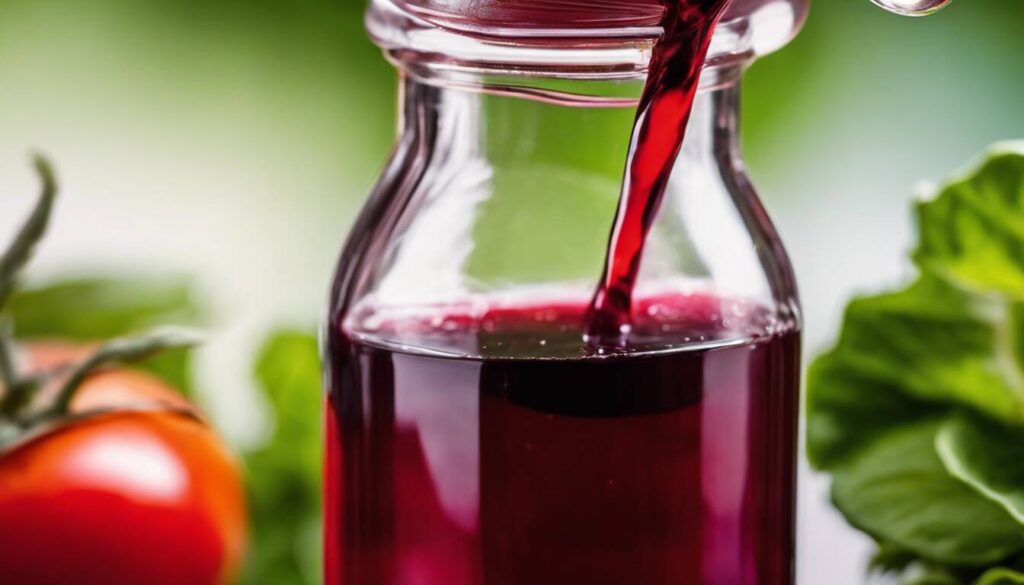Rice wine vinegar is a low-calorie, no-fat ingredient with a distinctively sharp flavor, thanks to its richness in acetic acid. It’s surprisingly potent nutritional profile consists of key minerals like potassium, magnesium, calcium, phosphorus as well as a good dose of antioxidants – more so in its darker variants.
An unexpected nugget is that, despite being low in sugar, it can impart a delightful hint of sweetness and tang to your dishes. So don’t hesitate to sprinkle some on your next salad or stir-fry. It’s time you experienced the tangy charm and health perks of rice wine vinegar.
Rice wine vinegar is believed to have health benefits, such as potentially aiding in controlling blood sugar levels, lowering cholesterol, and contributing to weight loss by increasing satiety. However, it’s important to consume it in moderation and consult with a physician before making significant changes to your diet or using it as a supplement, especially if you have specific medical conditions.

Nutritional Profile of Rice Wine Vinegar
Rice wine vinegar is a versatile ingredient known for adding zest to a variety of dishes, but its health advantages go beyond taste alone. When it comes to nutrition, rice wine vinegar is quite modest in terms of calories, sugar, and fat, making it an appealing choice for those who are health-conscious. In just a one-tablespoon serving, you’ll find minimal calories, no fat or sugar, and less than 1 gram of carbohydrates.
What stands out most is its acetic acid content, which contributes significantly to its characteristic tangy taste. This acid is renowned for its potential health benefits, such as improved digestion and blood sugar control. Moreover, rice wine vinegar contains essential minerals like potassium, magnesium, calcium, and phosphorus – crucial for maintaining overall health.
Rice Wine Vinegar Nutritional Information
Let’s take a closer look at the nutritional components found in rice wine vinegar:
| Nutrient | Amount per Tablespoon |
|---|---|
| Calories | Very minimal |
| Fat | None |
| Sugar | Almost negligible |
| Carbohydrates | Less than 1g |
| Acetic Acid | Significant |
| Potassium | Small amount |
| Magnesium | Minimal presence |
| Calcium | In trace amounts |
| Phosphorus | Present |
The extensive presence of antioxidants in rice wine vinegar also plays a key role in promoting good health. Darker varieties of the vinegar tend to be richer in antioxidants, making them particularly beneficial.
For those looking to enjoy the flavor and potential health perks of this vinegar without compromising dietary restrictions or health goals, these attributes make rice wine vinegar an excellent addition to their culinary endeavors.
By incorporating rice wine vinegar into your meals, not only do you infuse delightful flavors into your dishes, but you also introduce your body to valuable nutrients and compounds that can contribute to your overall well-being. Understanding the nutritional profile of this beloved ingredient further emphasizes its role as a beneficial addition to a balanced diet.
With a better understanding of the nutritional benefits of rice wine vinegar, let’s now explore some delicious recipes that make the most out of this wholesome ingredient.
Health Benefits of Rice Wine Vinegar
Rice wine vinegar isn’t just a flavorful addition to your meals; it also brings along several health benefits. Here’s a closer look at how this versatile vinegar can positively impact your well-being.
Blood Sugar Regulation
One of the most well-known potential benefits of rice wine vinegar is its ability to help control blood sugar levels. It’s especially beneficial for individuals with diabetes. The acetic acid in rice vinegar has been found to reduce blood glucose levels after meals, which can make it easier for those managing diabetes to control their blood sugar. This effect comes from the way acetic acid affects the enzymes that break down carbohydrates, leading to a slower release of glucose into the bloodstream and providing more stability throughout the day.
Cholesterol Management
Regular consumption of rice wine vinegar has also been associated with reduced cholesterol levels, contributing to improved heart health and a decreased risk of cardiovascular diseases. Studies have suggested that the acetic acid in rice vinegar may play a role in lowering cholesterol levels, particularly reducing harmful LDL cholesterol and total cholesterol, crucial for maintaining cardiovascular health and overall well-being.
Weight Management
Looking to manage your weight? Rice wine vinegar might be a helpful addition to your diet. The acetic acid present in rice wine vinegar can increase feelings of fullness, leading to a reduction in overall calorie intake and promoting weight loss. Additionally, it has been suggested that rice vinegar can suppress appetite, helping to prevent overeating and unnecessary snacking. By aiding in controlling food cravings and promoting satiety, this vinegar becomes an ally for individuals striving to maintain a healthy weight.
It’s fascinating to see how such a common pantry item like rice wine vinegar can actually offer significant health benefits beyond its culinary use. Incorporating it into your meals not only adds flavor but also contributes positively to your overall well-being.
With its numerous health benefits now uncovered, let’s now explore the diverse ways in which rice wine vinegar can be used in cooking to elevate your culinary creations.
Culinary Uses of Rice Wine Vinegar
Rice wine vinegar provides a wonderful combination of mild acidity and subtle sweetness, making it a staple in many kitchens, particularly in East Asian cuisine. Let’s delve into some of the most popular culinary applications of this delightful vinegar.
Salad Dressings
One common use of rice wine vinegar is in salad dressings. It adds a gentle tanginess that brightens up the flavors without overpowering them. For instance, mixing it with sesame oil, soy sauce, and a hint of honey creates a delicious Asian-inspired vinaigrette.
Incorporating rice wine vinegar into recipes, such as cucumber salads or coleslaw, adds a refreshing, acidic kick that complements the fresh vegetables wonderfully.
Marinades and Pickling
Rice wine vinegar works wonders as a marinade base for meat and seafood. Its acidity helps tenderize proteins while infusing them with an appealingly light and sweet flavor. It can also be used for pickling vegetables, from crunchy cucumbers to vibrant carrots and daikon radishes.
Combining rice wine vinegar with aromatic herbs and spices allows you to create mouthwatering marinades and pickling solutions that will elevate your culinary creations.
Sushi Rice
Authentic sushi rice requires rice wine vinegar. It’s a fundamental ingredient in sushi rice seasoning, bringing forth a delicate tartness that perfectly balances the sweetness of the seasoned rice. When mixed with sugar and salt, rice wine vinegar imparts the signature flavor profile that defines traditional sushi.
For those adventurous enough to make sushi at home, having a bottle of rice wine vinegar on hand is essential for achieving an authentic and delectable sushi rice base.
Dipping Sauce
Its gentle acidity makes rice wine vinegar an ideal component for crafting delectable dipping sauces. Whether you’re enjoying spring rolls, dumplings, or tempura, a well-crafted dipping sauce can elevate your dining experience. Blending rice wine vinegar with soy sauce, grated ginger, and a touch of chili creates an invigorating dipping condiment.
With its ability to harmonize flavors and add depth to dishes across diverse cuisines, rice wine vinegar proves itself as an indispensable kitchen staple that invites creativity and innovation in cooking.
The versatility of rice wine vinegar extends beyond its culinary uses; its health benefits make it an alluring addition to any diet. Let’s now explore the remarkable health advantages it offers along with exciting recipes that showcase its versatility.
Tasty Recipes with Rice Wine Vinegar

Rice wine vinegar has a way of infusing recipes with a tangy and slightly sweet flavor, elevating the simplest dishes to new heights. If you’re looking to create vibrant and appetizing meals, incorporating rice wine vinegar can be a game-changer, offering a delightful twist to your culinary creations.
Let’s start with an Asian Slaw. This refreshing dish features shredded cabbage and carrots dressed with a flavorful blend of rice wine vinegar, soy sauce, sesame oil, and a hint of honey. The tanginess from the rice wine vinegar perfectly complements the sweetness of the honey, creating a harmonious balance that will leave your taste buds dancing with joy. The versatility of Asian slaw makes it an ideal side dish for grilled meats, fish, or even as a topping for tacos.
Another delectable recipe that showcases the versatility of rice wine vinegar is Sweet and Sour Chicken. This classic Chinese dish features succulent pieces of chicken smothered in a tantalizing sweet and sour sauce made with rice wine vinegar, sugar, and ketchup. The rice wine vinegar plays a crucial role in balancing the sweetness of the sugar and ketchup, imparting that signature tanginess that defines this beloved dish. Whether you’re serving it alongside fragrant jasmine rice or as a standalone entrée, the lively punch of rice wine vinegar adds depth and complexity to the overall flavor profile.
Imagine drizzling that rich sweet and sour chicken sauce over fluffy white rice—each bite will tingle your taste buds with a perfect blend of sweet, sour, and savory flavors. It’s amazing how a single ingredient like rice wine vinegar can work its magic in transforming a dish into a culinary masterpiece.
The beauty of rice wine vinegar lies in its ability to add depth and character to your cooking without overwhelming other flavors. The two recipes we discussed here are just the beginning; there are countless ways to incorporate this versatile ingredient into your cooking repertoire, whether it’s adding brightness to marinades, dressings, or stir-fries.
As we savor the delightful flavors brought to life by rice wine vinegar in these delectable dishes, let’s now explore another facet of this exceptional ingredient—its surprising beauty benefits.
Beauty Benefits of Rice Wine Vinegar
Rice wine vinegar isn’t just for cooking—it can also work wonders for the skin. When diluted with water, it makes a fantastic toner for your skin, bringing about balance and harmony. It helps in maintaining the skin’s pH levels and tightening the pores.
Balancing pH Levels: Our skin has a thin protective layer on top called the acid mantle that plays a crucial role in preventing issues like breakouts, dryness, or oiliness. Using rice wine vinegar as a toner helps maintain the pH balance, keeping this important layer intact and ensuring your skin behaves itself.
Acting as a Natural Astringent: Astringents help clean out pores and tighten the skin, preventing dirt and debris from entering your skin.
Now, before you go pouring pure rice vinegar onto your face, always dilute it with water to find the perfect ratio for your skin. For instance, mix one part of rice wine vinegar with four parts of water. If your skin feels sensitive or you notice any redness, add more water next time until you find the perfect balance.
In addition to balancing pH levels and acting as a natural astringent, rice wine vinegar contains antioxidants that fight against free radicals, helping to lessen signs of aging like fine lines and wrinkles.
These surprising benefits make rice wine vinegar an impressive addition to your skincare regimen. Who would have thought that something used in cooking could be so delightful for your skin too?
It’s important to understand both the benefits and potential risks of using rice wine vinegar for various purposes. As we navigate through these aspects, we’ll shed light on important considerations to keep in mind when incorporating it into your routine.
Potential Risks and Precautions
While rice wine vinegar indeed has health benefits, it’s crucial to be aware of its potential risks as well. One such risk is associated with its acetic acid content, which can be harmful if consumed excessively. Acetic acid makes up about 4-7% of the content of rice wine vinegar, and this high acidity level can raise concerns about tooth enamel erosion. For individuals who occasionally experience acid reflux, it’s advisable to limit the intake of highly acidic foods and beverages.
Acetic acid is responsible for the distinctive taste and odor of rice wine vinegar, but it can also be abrasive on tooth enamel if not consumed cautiously.
The erosion of tooth enamel can lead to dental sensitivity and other severe dental issues after prolonged exposure. It’s vital to balance the diet with enough nutrients to maintain healthy teeth and gums. Individuals with concerns should opt for consuming rice wine vinegar in moderation or consult a healthcare professional before making it a regular part of their diet.
When using rice wine vinegar in recipes, moderation is still key. If you plan to incorporate it into dishes like salad dressings or marinades, being mindful of the serving sizes is imperative. A little goes a long way in enhancing flavors without overdoing it. By being cautious about the amount used in cooking, you can still enjoy its distinct taste while reducing potential risks associated with overconsumption.
It’s important to note that while some individuals may relish the flavor and versatility of rice wine vinegar, others might experience allergic reactions due to specific allergies to rice or alcohol. Although rare, allergic reactions are nonetheless possible. Hence, individuals with known allergies should exercise caution when incorporating rice wine vinegar into their diets.
In conclusion, while it’s true that rice wine vinegar offers health benefits when used in moderation, it’s equally crucial to prioritize dental health and overall well-being by being mindful of potential risks and seeking advice from healthcare professionals, particularly if specific medical conditions are a concern.
Support us at our merch shop!

